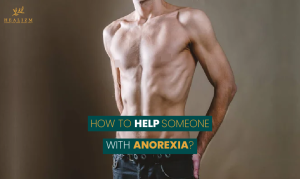
When someone you care about suffers from an eating disorder such as anorexia, bulimia, or binge eating, you should express your support.
Try the following:
- Offer personal support.
- Show them you care.
- Show your support by having open, empathetic conversations.
- Skip commenting on how they look or their weight.
- Focus on their strengths and qualities that go beyond appearance.
- Help during moments of need.
- Offer to assist in finding professional help and go with them to appointments if they’re okay with it.
To know more about anorexia and its treatment options, you can rely on Healizm.
What is Anorexia Nervosa?
Anorexia nervosa is a severe, even life-threatening, eating disorder that can be treated.
It is distinguished by severe dietary restrictions and an intense dread of gaining weight.
Psychological therapy, nutritional counseling, or hospitalization are commonly used treatment options.
People with anorexia have a false self-image of their bodies and an intense dread of gaining weight.
Anorexia is a severe medical disorder that requires treatment.
Extreme weight loss in those with anorexia can cause malnutrition and serious health problems.
Counseling, such as family therapy, can teach you how to foster healthy eating habits in children and adolescents with eating disorders.
Contact us to get help, support, and guidance.
Psysical Signs of Anorexia Nervosa
The most common physical symptom of anorexia is a person’s low body weight for their height, gender, and size.
It is crucial to realize, however, that anorexia does not always imply being underweight.
In addition to weight-related indicators of anorexia, there are physical symptoms that are the result of starvation and malnutrition.
Physical symptoms of anorexia include:
- Significant weight loss occurs over several weeks or months.
- Not maintaining an adequate body weight for your height, age, gender, stature, and physical health.
- Unexplained growth curve or body mass index (BMI) changes in youngsters and teenagers.
How is Anorexia Nervosa Treated?
Treatment will vary according to the sort of eating disorder your friend or relative has.
1. Talking Therapies
It will likely include some form of talking therapy given that assistance with eating and reaching a healthy weight is necessary.
Your friend or relative will speak with a therapist about the emotional issues that contributed to their eating disorder, and they will learn healthy methods to deal with these emotions.
Their treatment may also include completing a guided self-help curriculum.
2. Family Therapy
Some people may also receive family therapy, which is a form of group therapy. The person with the eating problem is urged to collaborate with family members to manage their eating condition.
Family therapy comprises parents and siblings, but it may also include close friends or other family members.
Duration of Treatment
Treatment will last several months, allowing your friend or a family member to adjust to the changes gradually.
The earlier the treatment begins, the better are the chances of a successful recovery.
Useful Information:
Complications Related to Treating Anorexia Nervosa
The most dangerous consequence of treating anorexia is refeeding syndrome. This life-threatening illness can develop when a severely malnourished person begins to obtain nutrients again.
Essentially, their body is unable to resume the metabolic process effectively.
People with refeeding syndrome may acquire the following conditions:
- Edema refers to swelling throughout the body.
- Heart failure.
- Respiratory failure.
- Gastrointestinal issues.
- Extreme muscular weakness.
- Delirium.
- Death.
Recovering from Anorexia Nervosa
Each person’s anorexia recovery process is unique. The most important thing to remember is that it’s possible to recover from it.
Anorexia treatment includes a variety of components, such as psychiatric therapy and nutritional counseling.
Conclusion
Supporting a friend with an eating disorder can be difficult, and it is acceptable to admit it. You may need to take some time out to care for your own mental health and wellness.
If your friendship is strained, you could discuss putting things on ‘hold’ for a bit.
Make a vow to each other that when you feel better, you will reach out and renew your friendship in a way that works for both of you.
FAQs
What are the 2 leading causes of anorexia?
The causes of anorexia nervosa are not fully understood but these can increase your risk:
- Genetic risk factors
- Cultural factors
What is a typical characteristic of anorexia nervosa?
Anorexia is an eating disorder defined by meager body weight, an intense fear of gaining weight, and a skewed sense of weight.
What is the most severe case of anorexia?
End-stage anorexia nervosa is the most severe and deadliest type of the disorder. Those with end-stage anorexia appear exceedingly underweight, with a BMI of less than 15, and are suffering from medical and psychological consequences.
